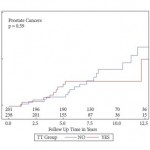Editorial: Malignant medication? Testosterone and cancer
Testosterone therapy (TTh) in men with hypogonadism is becoming more commonplace among urologists, endocrinologists and even primary practitioners. While the definition of hypogonadism remains a moving target, the literature reflects very clear benefits of TTh in appropriately selected patients. As with any drug, the adverse effect profile helps to dictate the risk:benefit ratio and, over the past several years, numerous, primarily retrospective, analyses have provided mixed insights into the impact of TTh on cardiovascular disease and cancer, specifically prostate cancer.
Eisenberg et al. [1] take a step back from the focus on prostate cancer and evaluate the impact of TTh on general cancer incidence in a cohort of men treated in a single, large-volume andrology practice over 20 years. The authors found no difference in either overall cancer incidence or in the prostate cancer incidence in men on TTh in comparison with men not on TTh. This finding is significant as it supports the hypothesis that testosterone does not harmfully affect either hormonally responsive (prostate cancer) or non-hormonally responsive malignancies. Interestingly, the authors also observe a lower rate of all cancers in men on testosterone therapy. While not statistically significant, this finding is consistent with that of at least one other study focused on prostate cancer, in which men with high-risk prostate cancer receiving exogenous testosterone had a lower recurrence rate than a matched control group [2]. If borne out in future studies, a protective relationship between TTh and cancer would indeed reflect a novel benefit of treatment.
Nevertheless, at this time the jury remains out on a definitive assessment of the effects of TTh on both cancer as well as cardiovascular disease, and will probably continue to do so until controlled, prospective studies are completed. Numerous, mostly retrospective studies have examined the effects of endogenous testosterone and of the administration of exogenous testosterone, primarily on prostate cancer. While the details of these studies are beyond the scope of the present editorial, their findings have varied with regard to whether testosterone does or does not have effects on cancer incidence, biopsy findings, grade, recurrence rates and margin status, preventing a clear perspective on the effects of testosterone on cancer. Similarly, studies evaluating the impact of TTh on cardiovascular disease have also widely varied in their conclusions [3, 4]. Several recent large retrospective studies have found a detrimental relationship between TTh and cardiovascular disease in specific male populations, but have come under withering criticism from the community, with significant doubts cast regarding the veracity of their findings [5, 6].
The growing popularity of TTh has subjected it to a level of scrutiny applied to few other medications, resulting in a slew of peer-reviewed publications of varying quality and conclusions. In the effort to safeguard patients, investigators have hurriedly carried out retrospective data evaluation, which, by design, limits compensation for confounding factors and unfortunately results in an overall murky understanding of long-term adverse events related to TTh. Nevertheless, the clinical benefits of TTh are clear, and many patients are satisfied with the results of treatment. While physicians should remain the stewards of patient care, informed consent and a patient’s acceptance of both the known as well as the unknown risks of testosterone treatment should continue to be an integral part of the initiation and continuation of TTh, until additional high-quality data from clinical trials become available in the coming years.



